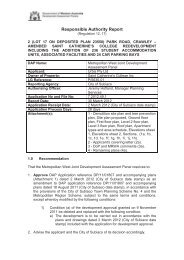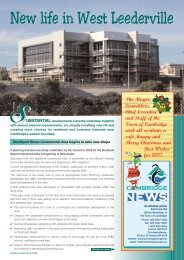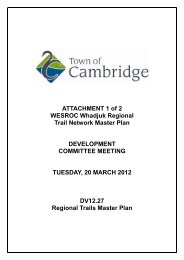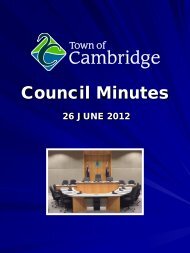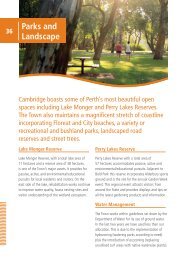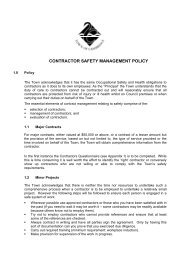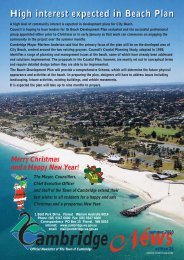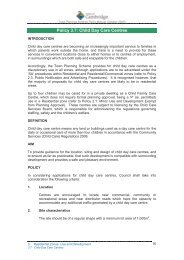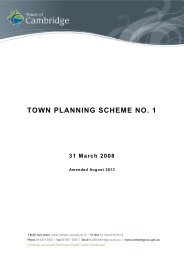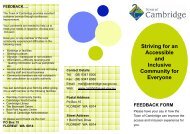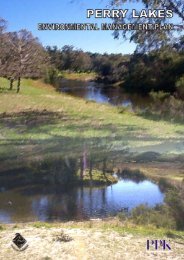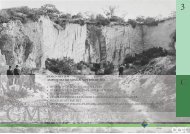MEETING OF COUNCIL - Town of Cambridge
MEETING OF COUNCIL - Town of Cambridge
MEETING OF COUNCIL - Town of Cambridge
- No tags were found...
You also want an ePaper? Increase the reach of your titles
YUMPU automatically turns print PDFs into web optimized ePapers that Google loves.
<strong>COUNCIL</strong> MINUTESTUESDAY 26 FEBRUARY 2013Variable Refrigerant Volume System (VRV)Variable Refrigerant volume systems operate like a normal direct expansion (DX) airconditioning system but have the ability to control the volume <strong>of</strong> refrigerant by varying thespeed <strong>of</strong> the compressor. This makes them far more efficient than normal large scalerefrigerated air conditioning systems.It also means that the building can be divided into smaller sections which need only be enabledwhen required which is very advantageous when considering after hours use <strong>of</strong> specific areassuch as the rangers Office and Council Chambers.They also have the advantage <strong>of</strong> being able to provide simultaneous heating and cooling todifferent areas which allows individual comfort control at a very high level and can beincorporated with an Economy Cycle to deliver genuine future energy savings.Economy CycleEconomy cycles measure the conditions within the building against outside ambient conditionsand utilise the fresh air when advantageous. This not only results in lower operating costs dueto energy savings but can also greatly improve conditions within the building for the occupantsdue to the increased amount <strong>of</strong> fresh air.An economy cycle has the potential to reduce cooling plant energy costs by up to 20% whichwill significantly lower the greenhouse emissions associated with the building and subsequentlyits carbon foot print.Although an economy cycle has been incorporated in the existing system, it has been addedonto the original design and does not take full advantage <strong>of</strong> the potential savings available.Any new air conditioning system installed in the building will require installation <strong>of</strong> a trueeconomy cycle to conform to current BCA/NCC Section J5 requirements.Systems with lower carbon footprints such as geothermal were considered, however, it wasnoted that there was significant capital cost differences (>$1m) over preferred options andmuch longer payback periods (>10 years) before they came into parity with more conventionaloutcomes. It is also noted that the significant technical risks associated with these systems areproving challenging elsewhere.Attachment 1 provides an extract from the full consultancy assessment.POLICY/STATUTORY IMPLICATIONS:The <strong>Town</strong>'s Asset Management Policy 5.4.9 adopted in April 2012 includes as a principle thatconsideration be given to life cycle costs prior to a decision being made to replace an asset.The preferred system has strong credentials in this regard.FINANCIAL IMPLICATIONS:The scope <strong>of</strong> the consultancy, to be undertaken in this (2012/13) financial year includesfinalisation <strong>of</strong> design, preparation <strong>of</strong> tender documents and completion <strong>of</strong> a pre-tender estimate<strong>of</strong> capital costs. It will be necessary to undertake works in 2013/14 as the risk and completesystem failures are increasing.A funding amount <strong>of</strong> $300,000 is currently held in the Asset Management reserve. During thelast three budgets, $100,000 has been allocated each year for this air conditioning upgrade.H:\CEO\GOV\<strong>COUNCIL</strong> MINUTES\13 MINUTES\FEBRUARY 2013\C CR.DOCX 130



